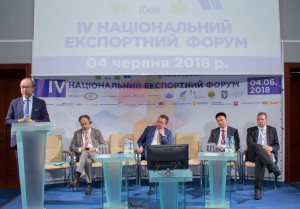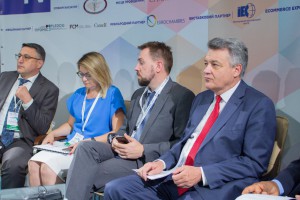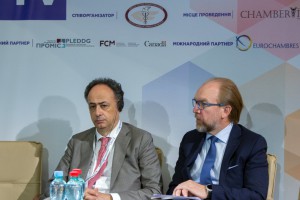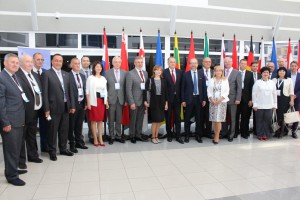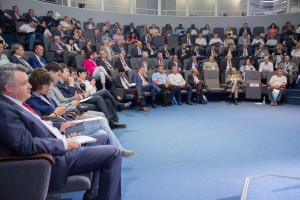Source: Chamber of Commerce and Industry of Ukraine
Which opportunities does the state offer today to domestic exporters for having access for Ukrainian goods and services to foreign markets? How to present the project to an investor to maximum effect? What are the further steps for implementing a national export strategy? Answers to these and other questions were pursued by the participants of the first two panel discussions.
The Forum started with the discussion on “Export and Global Challenges” Hugues Mingarelli, EU Ambassador to Ukraine, told the participants about the ways of supporting Ukraine to implement the provisions of Ukraine-EU agreement on free trade area (DCFTA).
“EU market is a high-priority trade platform in the world. Our sympathies are with you; nonetheless, Ukraine should make use of all opportunities for export diversification. That is why the Delegation of the European Union to Ukraine are actively working with the Chamber of Commerce and Industry of Ukraine with a view to assisting Ukrainian companies to enter this market. And we can state positive results, as nowadays the share of Ukrainian export to EU is 43%. The total number of Ukrainian companies exporting to EU is 14 thousand enterprises. And these are not the large companies only”, – Hugues Mingarelli said.
He said the rating of the European countries having the largest share of Ukrainian export. The first place is taken by Poland, then Italy, Germany, and the Netherlands go. Hugues Mingarelli also pointed at that not only agricultural products, despite established opinion, are being exported from Ukraine to EU, but also, in particular, the products of engineering (12%) and processing (26%) industries.
In his turn, Samat Ordabayev, Ambassador Extraordinary and Plenipotentiary of the Republic of Kazakhstan to Ukraine, highlighted the condition and the prospects of trade and economic cooperation of Ukraine and Kazakhstan.
“Development of the Ukrainian export policy is vital for Kazakhstan. The time of simple supplies went by, – now we should seek new forms of cooperation and clearly define the trading areas. I see the prospects in cooperation and creation of joint enterprises with preferential opportunities used”, – he said.
Samat Ordabayev said IT and renewable energy were upcoming sectors.
“The prospects are made up of high technologies bringing large valued added. For the two years of my work in Ukraine, the number of such joint enterprises has increased from 505 to 923”, – the Ambassador said.
The Chamber remains to be a platform for communications between business and power. Many entrepreneurs have managed, due to the Chamber, to open for themselves conceptually new trading areas, in particular, the Chinese one, and to find partners from various parts of the world.
“China keeps opening access to its market for Ukrainian agricultural products. There, currently, the negotiations are being held as for cherries, and for future periods – it is fish, honey, and egg products”, – Liu Jun, the Economic and Commercial Counselor of the Embassy of PRC to Ukraine, said.
He also mentioned that Ukrainian products have unique advantages and told the participants about China International Import Expo to be held in Shanghai on November 5-10, 2018, with 16 Ukrainian companies taking part.
Kristian Kirpal, Chairman of the Leipzig Chamber of Industry and Commerce (Germany), shared the experience in supporting export of the region based on his city’s case. Thus, the Leipzig Chamber of Industry and Commerce supports exporters in three directions: provides information on investment opportunities in a number of countries, assists to establish direct contacts for entering the markets of various countries, and arranges all kinds of events – from Economy Days to Industrial Exhibitions.
The Forum went on with “Implementation of National Export Strategy of Ukraine” panel discussion. Olesya Zaluska, Advisor to the First Vice-Prime Minister – Head of the Ministry of Economic Development, presented the following steps to implement the Export Strategy of Ukraine.
“Our goal is to upscale useful practical tools for business. To this end, we are implementing four cross-sectoral strategies: innovations for export, trade agenda, improvement of skills, and simplification of trade procedure”, – she said, having called business for more active involvement in development of the strategies.
Serhiy Svystil, the Vice-Chairman of the Chamber of Commerce and Industry of Ukraine, told the participants about activity of chambers of commerce and industry under the conditions of contemporary challenges and risks from a global trade perspective.
“The best first step toward enlargement of export for any enterprise is to develop individual Company’s Export Strategy. The best practices are using foreign technical aid, attracting European experts in the framework of cooperation with the service of German experts, creating representative offices in the EU countries or signing distribution agreements, using the mechanisms of trade funding, and building cooperation in manufacturing. The latest trend in external trade is constructing manufacturing based on existing trade preferences. Specifically, it is so when for import of component parts and raw materials, and for further export, they choose the countries with minimal level of customs duties, – while processing and manufacturing in Ukraine are minimally sufficient, considering the established rules for determining of the country of origin”, – Serhiy Svystil said.
According to his opinion, the priority trading areas for our products become diverse relative to industrial and food groups of commodities. Joint efforts of power, business, and business associations facilitate opening new markets.
During this panel discussion, “PLEDDG” project (“Partnership for Local Economic Development”) was presented as well. This is the project of international technical aid aimed at enhancing the municipal sector in Ukraine, creating favorable environment for development of small and medium-sized businesses, supporting the decentralization process and integrative development planning at local, regional, and national levels. It is implemented from April 2015 to December 2020 by the Federation of Canadian Municipalities (FCM) and funded by the Government of Canada in four regions of Ukraine: Zaporizhia, Vinnytsia, Ivano-Frankivsk, and Poltava. Each city has been allocated 100 thousand Canadian dollars. Presently, due to the project, the domestic knitwear and apparel can enter Canadian market as well.
Moreover, in the framework of the discussion, the participants learned about export opportunities for Ukrainian companies in Nigeria and Dubai.
“Today, the economy is in need of changes. Meanwhile, business needs ideas, financial support and assistance in its promotion to external markets. May be, we should employ the Chinese experience based on the principle of Learning by doing”, – Volodymyr Vlasiuk, the moderator of the discussion, Head of the Committee of Industrial Modernization at CIC of Ukraine, Director of State Enterprise “Ukrpromzovishekspertyza”, summed up.


